Posts Tagged ‘Muriel Spark’
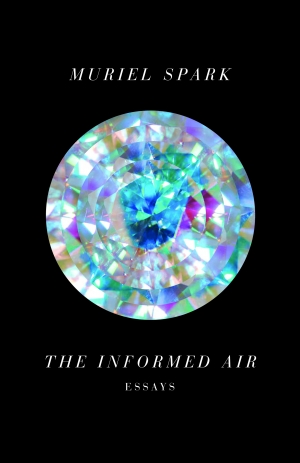
“I’ve never met a really good writer who lives in high style. I think a stylish life is unsuitable to the writer, and very often in the house where there’s a mild disorder one finds the writer with the best powers of organising his work. Order where order is due.”
Muriel Spark— “The Poet’s House”
Read this and many other wonderful essays by Muriel Spark in The Informed Air, which will be released by newdirectionspublishing on April 29th.
(Source: kevinelliottchi, via maudnewton)
(I’m counting the days until this book comes out!)
November 18, 2013 @ 7:57 pm | Filed under:
Books 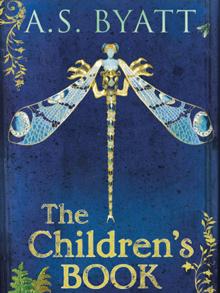
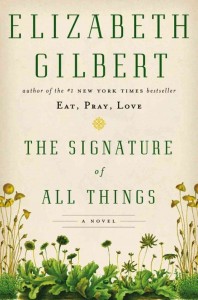 I’m not in a book club at present, but I’ve been entertaining myself with thoughts of what books I would suggest to my book club if I belonged to one. This is because I finished Elizabeth Gilbert’s sweeping, sad, thoughtful The Signature of All Things, and naturally I’m yearning for a nice long discussion of it, preferably involving baked goods. (I’m also wanting to start a moss garden, which in San Diego would be no mean feat.)
I’m not in a book club at present, but I’ve been entertaining myself with thoughts of what books I would suggest to my book club if I belonged to one. This is because I finished Elizabeth Gilbert’s sweeping, sad, thoughtful The Signature of All Things, and naturally I’m yearning for a nice long discussion of it, preferably involving baked goods. (I’m also wanting to start a moss garden, which in San Diego would be no mean feat.)
Other books I would throw into the ring:
1) The Diamond Age, Or: A Young Lady’s Illustrated Primer by Neal Stephenson. I read it a year or two before the advent of the iPad, and when that magical device appeared, all I could think of was the Primer. I enjoyed the book’s exploration of a ‘best’ education—what that might look like, what its aims might be, and the unpredictability of outcomes. And the mind-stretching nanotechnology permeating and altering society: this is a richly layered and sometimes difficult book, with much that made me uncomfortable (something I appreciate in a book), but also a compelling page-turner of a narrative. It’s one of those books I think about in the context of daily life quite often (and not just in connection to the iPad). It would be fun to dig into with a really lively, argumentative group of readers.
2) The Children’s Book by A. S. Byatt. I’ll be drummed out of my own imaginary book club if I keep suggesting these mammoth tomes, but there it is. I’ve read The Children’s Book twice (three times? I’m losing track) in four or five years (also losing track; can’t be bothered to check my log now) and like The Diamond Age (and, I suspect, The Signature of All Things), it’s a book I find myself pondering in many a stray moment. A curling fern frond, a strand of seaweed, a beautifully glazed pot, the Nesbit books on my shelf, a reference to William Morris, a pre-Raphaelite painting, a sinister undercurrent in a fairy tale—any number of things send me straight back into the pulsing green world of this Fabian family and their troubled, talented, struggling circle of artist-friends. Downton Abbey was full of reminders (Lavinia’s clothes, Sybil’s causes, Branson’s political activism, the devastation and radical shifting of relationships and ways of life during and after WWI). No work of fiction in recent years has sent me on more rabbit trails, nor hounded my thoughts so relentlessly.
3) Feed by M. T. Anderson. It’s been several years; I’m due for a reread. Every year this book feels more prescient. We may not have the Feed implanted in our brains quite yet, but we’re closer than we were the first time I read it. Won’t it be fun to fumble for words about how alarming we found the notion of a society so dependent on an advertising-driven stream of information piped directly into their minds that people can barely form a coherent thought anymore, much less an original one? And then we can all post photos of our desserts to Instagram.
4) Hmm, we’ll need something by Muriel Spark. A Far Cry from Kensington, I think, but perhaps I’m leaning too much on my own favorites. Certainly The Prime of Miss Jean Brodie would provide fodder for hours of discussion. Actually, Miss Brodie would make a tremendous follow-up to Feed and The Diamond Age: all of them exploring ways of educating (even shaping) young minds. Oh, what am I talking about—Signature and The Children’s Book fall right into that category as well. Education isn’t by any means the only theme of these books, but it’s a dominant thread in each, one way or another. You’d almost think this was a pet topic of mine, or something.
5) Well then, let me throw something entirely different into the mix: how about American Terroir: Savoring the Flavors of Our Woods, Waters, and Fields by Rowan Jacobsen. I can brag about how he’s a friend and former classmate of mine, and of course we’ll have to have a tasting party to accompany our discussion of this book, a fascinating exploration of how terrain affects flavor (in many subtle ways), and why certain regions are famous for specific foods. I’ll bring the chocolate, you bring the maple syrup.
6) Now here I go reverting back to favorite books about unconventional upbringings, but when’s the last time you read Midnight Hour Encores? It’s one of my favorite YA novels, right up there with Emily of Deep Valley (though utterly unlike) and…hmm, that’s a different list, my favorite YA. Anyway: Encores features one of my favorite dads in all of literature, and an ending that takes my breath away every time.
7) But it isn’t quite fair of me to stack the deck with books I’ve already read, most of them more than twice. How about something new? I’ve got Donna Tartt’s latest, The Goldfinch, on hold at the library. I’m #70 in the queue, but since this is an imaginary book club, I’ll just imagine myself next in line.
How about you? What’s up next in your book club—real or imagined?
Tags: A.S. Byatt, American Terroir, Bruce Brooks, Elizabeth Gilbert, Emily of Deep Valley, Feed, M.T. Anderson, Midnight Hour Encores, Muriel Spark, Neal Stephenson, Rowan Jacobsen, Signature of All Things, The Children's Book, The Diamond Age, The Prime of Miss Jean Brodie, what I'm reading, what to read in book club, YA
August 26, 2013 @ 7:39 pm | Filed under:
Books 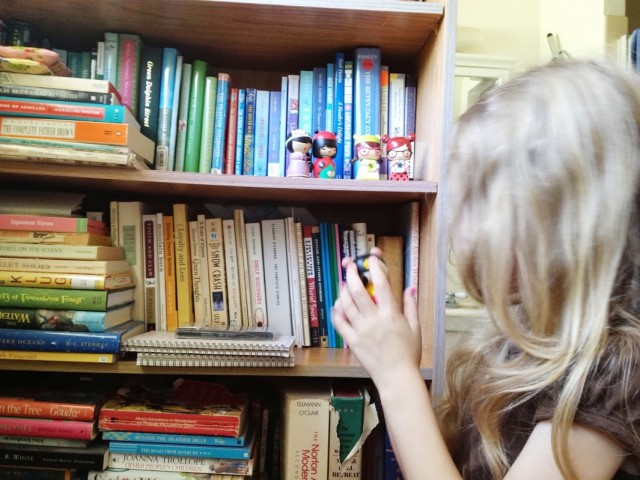
She’ll perch on a stool and play with the wooden dolls on my shelves by the hour. This is how Sunday afternoon unfolds: her soft doll-chatter murmuring beside me while I’m reading, studying, or (as was the case this weekend) cleaning out closets.
I see Joanna Trollope’s Other People’s Children peeking out from one of the stacks; I read it on (I think it was) Lesley’s recommendation and found it wholly absorbing, thoughtful, vivid, a bit sad. I liked it very much. Those shelves are a jumble of things I’m eager to read but haven’t had a chance yet (Green Dolphin Street, borrowed from my friend Carmen; The Light Between Oceans, a gift from my publisher last Christmas; Brideshead Revisited, because I still—still! still!!1!!—haven’t, among others) and books I love so much I need to keep them close. (A Far Cry From Kensington; One Man’s Meat; Dear Genius; etc. etc. etc.)
Notable picture-book reads of late: The Artist Who Painted a Blue Horse—a top-ten favorite of Rilla’s, and she’ll talk your ear off about the highlight colors in the paintings, if you like; Miss Suzy, back in frequent rotation; Open This Little Book, of which Huck cannot get enough; and to Huck for the very first time—oh! this particular milestone has been one of the most delightful I’ve experienced with each of the kids, one by one—Make Way for Ducklings. You can tell he’s the sixth child, not getting his full measure of McCloskey until the ancient age of four and a half. Scandal!
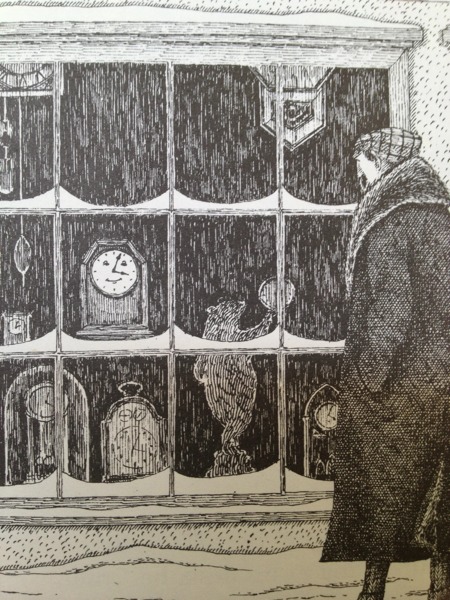
“To be perfectly honest, Ticky,” said Professor John, “I do not care for grandfather clocks as a rule. They are so very tall that one can never look into their faces and see what they are thinking. But your grandfather must be a very special clock, and it is always a good thing to have an ancestor who lives in a castle.”
—The Very Fine Clock by Muriel Spark, illustrated by Edward Gorey (1968)
On William, a highly intelligent medical student with an impoverished background:
“What moved and astonished me most was that he knew no nursery rhymes and fairy stories. He had read Dostoevsky, Proust, he read Aristotle and Sophocles in Gree. He had read Chaucer and Spenser. He was musical. He could analyse Shostakovich and Bartok. He quoted Schopenhauer. But he didn’t know Humpty Dumpty, Little Miss Muffet, the Three Bears, Red Riding-Hood. He knew the story of Cinderella only through Rossini’s opera. And all that sweet lyricism of our Anglo-Saxon childhood, a whole culture with rings on its fingers and bells on its toes, had been lost to him in that infancy of slums and smelly drains, rats and pawnshops, street prostitutes, curses, rags and hacking coughs, freezing bare feet and no Prince Charmings, which had still been the lot of the really poor in the years between the first and second world wars. I had never before realized how the very poor people of the cities had inevitably been deprived of their own simple folklore of childhood.”
On why writers should have cats:
“Alone with the cat in the room where you work, I explained, the cat will invariably get up on your desk and settle placidly under the desk-lamp…will settle down and be serene, with a serenity that passes all understanding. And the tranquillity of the cat will gradually come to affect you, sitting there at your desk, so that all the excitable qualities that impede your concentration and give your mind back the self-command it has lost. You need noto watch the cat all the time. Its presence alone is enough. The effect of a cat on your concentration is remarkable, very mysterious.”
“‘You are writing a letter to a friend,’ was the sort of thing I used to say. ‘And this is a dear and close friend, real—or better—invented in your mind like a fixation. Write privately, not publicly; without fear or timidity, right to the end of the letter, as if it was never going to be published, so that your true friend will read it over and over, and then want more enchanting letters from you. Now, you are not writing about the relationship between your friend and yourself; you take that for granted. You are only confiding an experience that you think only he will enjoy reading. What you have to say will come out more spontaneously and honestly than if you are thinking of numerous readers. Before starting the letter rehearse in your mind what you are going to tell; something interesting, your story. But don’t rehearse too much, the story will develop as you go along, especially if you write to a special friend, man or woman, to make them smile or laugh or cry, or anything you like so long as you know it will interest. Remember not to think of the reading public, it will put you off.”
—from A Far Cry from Kensington by Muriel Spark
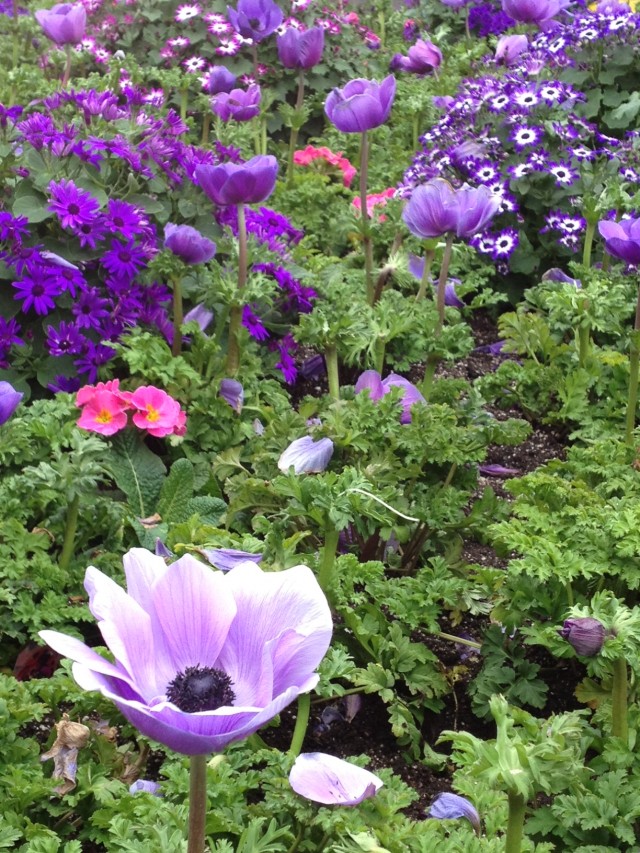
I just wrote a long rambly dissertation on linksharing across various platforms, the pros and cons thereof, and then I decided it was too rambly even for me. So here’s a pretty picture instead. 😉 These gorgeous blooms dazzled us at the outdoor mall today, where I took Huck and Rilla to get new shoes. We stopped for a bun at Panera and it’s possibly the first time I’ve ever been in a cafe with just those two; it was delightful, all chatter and energy, Rilla proudly cutting the bun in half and then carving her half into tiny bites, a frown of concentration, a very straight back. Toward the end an older couple got up from the next table and stopped to speak to us. “I’m usually quick to complain,” said the woman, rather ominously, “but—” and then lots of nice things about my children. Whew. The man was her “baby brother,” she told us, and it seems they quite enjoyed seeing miniature versions of themselves sharing a treat together.
Then we went to the shoe store, and Rilla hit her head on a shelf and the whole outing ended in tears. Which is pretty much how these things go. (She’s fine.)
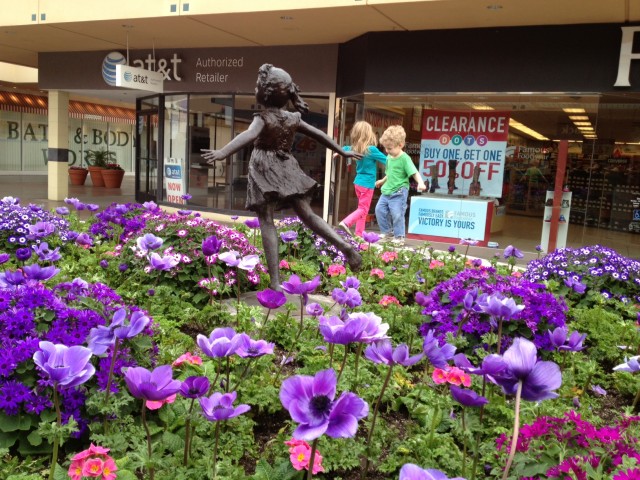
Before the fall
The older girls got a book of Zelda sheet music for Christmas and have been learning the songs from their favorite Zelda iteration, Twilight Princess. I gave them the Lord of the Rings score as well because I want to hear those songs resounding through the house. This strategy is paying off quite nicely.
Reading notes: I finished Girls of Slender Means and have moved on to A Far Cry from Kensington, and the thing about Muriel Spark is that now that I’ve read her, she’s in my thoughts so constantly (this is the case ever since Memento Mori a couple of years ago) that I can hardly remember not having her voice among the influencers in my head. How did I, a reader, a book junkie, a student of literature, make it this long without Spark? How did I know how to look at streets and sentences without her? This is how she makes me feel. Her sentences are like the blades of ice skates, sharp, swift, carrying you along at some risk to your personal comfort. Sometimes Jane and I say to each other, can you imagine life without knowing Monty Python? Can you imagine living in the world without Holy Grail in the back of your mind? That’s how I feel about Muriel Spark. And I felt the same way last year after reading Elizabeth Goudge’s The Scent of Water. And before that, A. S. Byatt’s unbelievably rich (and dark) The Children’s Book, which I’ve read three times in as many years. Which realization sends a thrill up my spine: who else is out there waiting for me, waiting to change my world? Oh, writers of books, I adore you.
“The difficulty of getting rid of even one half of one’s possessions is considerable, even at removal prices. And after the standard items are disposed of—china, rugs, furniture, books—the surface is merely scratched: you open a closet door and there in the half-dark sit a catcher’s mitt and an old biology notebook.”
—E.B. White, “Removal,” One Man’s Meat
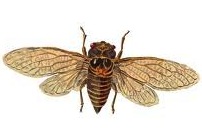
“…you should think of will-power as something that never exists in the present tense, only in the future and the past. At one moment you have decided to do or refrain from an action and the next moment you have already done or refrained; it is the only way to deal with will-power….I offer this advice without fee; it is included in the price of this book.”
—Mrs. Hutchins, the narrator of Muriel Spark’s A Far Cry from Kensington
January 14, 2013 @ 8:59 pm | Filed under:
Books 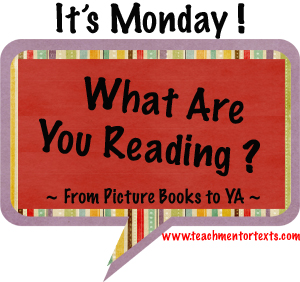 Every Monday, Jen and Kellee at Teach Mentor Texts host a What Are You Reading? meme. Since there’s no question I like better, I’ll chime in.
Every Monday, Jen and Kellee at Teach Mentor Texts host a What Are You Reading? meme. Since there’s no question I like better, I’ll chime in.
Things we read around here today:
(To Rilla)
Peter and the Talking Shoes by Kate Banks, illustrated by Marc Rosenthal. I’ve enthused about this one before. One of my family’s longtime favorites. Peter has new (hand-me-down) shoes, whose rich life experience comes in handy when he has to fetch a series of necessary objects for local merchants: a feather to make the baker’s bread light, a key so the carpenter can unlock the door to the house she’s working on, and so on. It’s one of those delightful cumulative tales with a satisfying ending, and Marc Rosenthal’s art is priceless. We have mad love for this quirky book (now sadly out of print).
A Wonder Book for Girls & Boys by Nathaniel Hawthorne. Rilla knows the Greek myths pretty well (thanks to Jim Weiss and D’Aulaire), but it’s hard to beat Hawthorne’s elegant retelling.
(Many times this past week, to all three of my youngest kids)
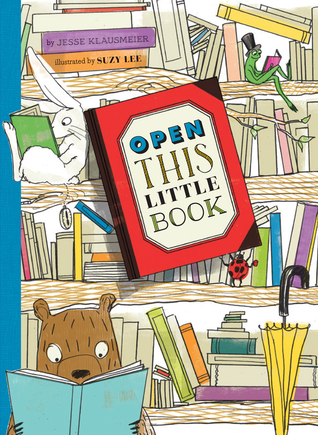
Open This Little Book by Jesse Klausmeier, illustrated by Suzy Lee. A series of quirky creatures is reading a series of little books, each smaller than the next. Very clever way to play with the convention of the codex. All those adorable nested books are irresistible to my kids. And the art, oh the art: utterly to swoon for.
(To me, at bedtime; at least, that’s the plan)
The Girls of Slender Means by Muriel Spark. So far this is my favorite Spark yet. (I think the Monday meme is for children’s/YA titles only, but I can’t do a roundup without including my own current read.)
How about you?








 Every Monday, Jen and Kellee at
Every Monday, Jen and Kellee at 